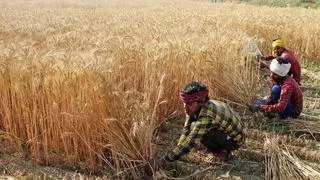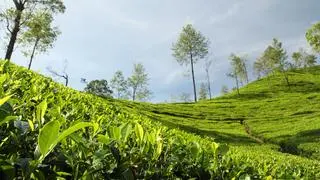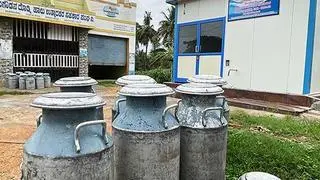India’s coffee output for the crop year 2023-24 starting October is set to be lower as erratic weather will likely impact yields and quality, growers said.
Addressing the media ahead of the annual conference, Karnataka Planters Association ( KPA) Chairman Mahesh Shashidhar said most of the areas this year have received 50 per cent of the rainfall in two weeks of July. “The erratic weather and rainfall patterns have had a huge impact on plantation crop yields and quality” he said urging the government to include coffee under the Fasal Bima Yojana.
Rain impact
While August was largely dry, coffee areas are currently receiving rainfall, which is considered bad for the standing arabica crop that is being harvested in various pockets. State-run Coffee Board, in its post-blossom or initial estimates, had pegged the 2023-24 crop at 3.74 lakh tonnes (lt) comprising 1.13 lt Arabicas and 2.61 lt robustas. During 2022-23, the coffee output stood at 3.52 lt including 1 lt Arabica and 2.52 lt Robusta.
“We may see a similar crop or a decline of 5-10 per cent over last year’s final estimates” Mahesh said. “It is difficult to estimate the quantity and a clearer picture would emerge as the harvest makes a progress” he said.
Also read: Govt to monitor agricultural news using AI, launches Krishi 24/7
The picking of early ripened arabicas have started across all the tree districts but the current spell of rains are seen affecting the quality as the ripened fruits are splitting on the plant under the rain impact. “While the crop may look good on the plant, but the actual status would be known once it is harvested as the berry development has been impacted by erratic rains this year,” Shashidhar said.
However, Ajoy Thipaiah, Chairman of Upasi Coffee Committee, said the crop may be lower by 25-30 per cent over the Coffee Board’s initial estimate of 3.74 lt, based on the prevailing crop conditions and weather.
Shashidhar said the annual rise in cost of production of about 10-15 per cent — driven by higher input and labour costs — is posing a challenge to growers as the price realisation is not commensurate with the rising costs. The KPA chairman urged the Finance Ministry to exempt plantations from SARFESI Act as they are agricultural properties. Shashidhar said the plantations should be excluded from CIBIL as plantations are agriculture in nature.
Further, the development schemes proposed by the Coffee Board should be implemented by the Commerce Ministry for growers and exporters for the plan period 2021-22 to 2025-26 and make applicable the schemes to all categories of growers, he said.
UPASI chairman Shreedharan C said the rates notified under RODTEP scheme for coffee should be increased to 8.5 per cent from 1.4 per cent considering the huge export potential for the commodity.
Man-animal conflict
The KPA chairman highlighted the rising instances of man animal conflicts, which have become unbearable. The human casualties due to man-animal conflicts in the coffee districts of Karnataka, which stood at 12 in 2022-23 have almost doubled to 23 in the April-August period this year, he said.
To prevent this, the KPA chairman urged the Government to increase allocation for construction of rail track fences along the forest boundaries, translocate troublesome elephants and improve habitats in forests to prevent animals from trespassing into plantations.








Comments
Comments have to be in English, and in full sentences. They cannot be abusive or personal. Please abide by our community guidelines for posting your comments.
We have migrated to a new commenting platform. If you are already a registered user of TheHindu Businessline and logged in, you may continue to engage with our articles. If you do not have an account please register and login to post comments. Users can access their older comments by logging into their accounts on Vuukle.